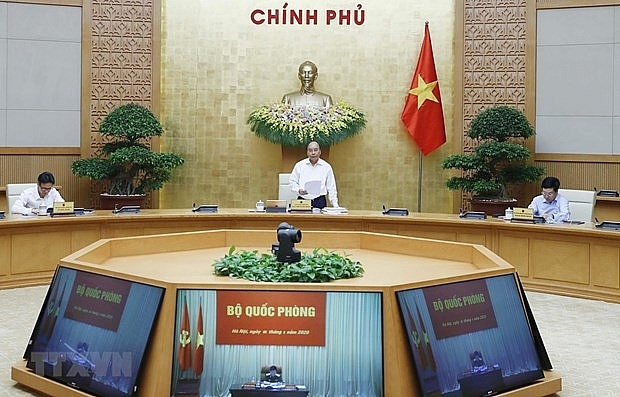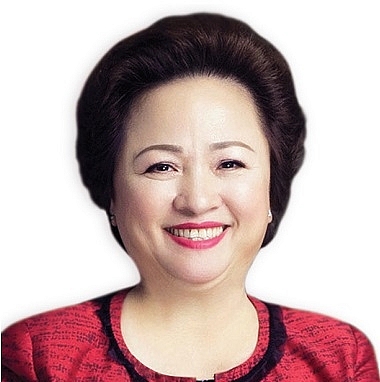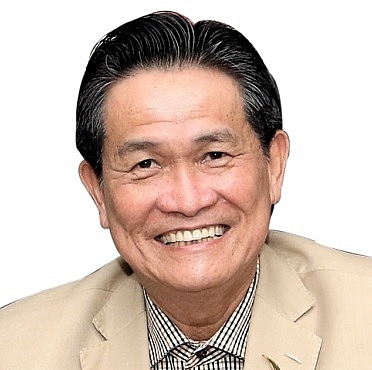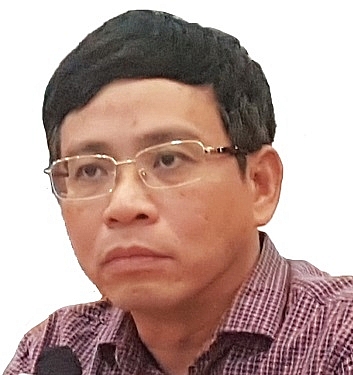Virus success can drive investment elevation
 |
| Prime Minister Nguyen Xuan Phuc (standing) speaks at the meeting (Photo: VNA) |
At the weekend’s largest-ever online dialogue between the prime minister and the business community – attracting thousands of domestic and international businesses – increase of foreign investment attraction to the country was one of the key topics.
Being the first minister to make a speech at the important event, Minister of Planning and Investment Nguyen Chi Dung said that successful control of COVID-19 has increased the country’s prestige in the international arena.
“This creates a driving force for Vietnam to increase its reputation as a safe and attractive destination, and makes the country ready for new investment shifts,” he noted.
In this spirit, it remains crucial to help businesses to recover and develop further as soon as the pandemic is fully controlled in the country, thereby contributing to raising the country’s standing and maintain economic growth targets.
As such, the event focused on four main issues: assessing the impacts of COVID-19 on business activities; assessing the feasibility of supporting policies issued by the government, ministries, and localities; new development opportunities in the new period; and recommendations from ministries, localities, and the business community to foster recovery and post-pandemic development.
Vu Tien Loc, chairman of the Vietnam Chamber of Commerce and Industry (VCCI), which represents voices of thousands of businesses, recommended to enhance administrative reform to increase national competitiveness and improve the business climate.
“To actively welcome foreign investment inflows, I suggest the government assigns ministries to work with the VCCI and local authorities on a national investment promotional strategy to approach powerful groups and supply chains worldwide,” he said.
Ministries, localities, and the business community concentrated their recommendations on development of new supply chain links amid a fault of traditional ones and breakthrough chances for potential sectors such as digital economy, digital transformation, and better healthcare.
Specifically, the Ministry of Finance (MoF) has so far issued documents guiding the exemption and reduction of fees and tax while promoting online tax payments. They include land tax, the exemption of import duty for materials, and business registration fees, among others.
The MoF will concentrate on ten solutions in the coming time to continue facilitation of business activities. They include reduction of land leasing fees for the affected businesses together with other cuts, a reduction of import and export taxes, an exemption of agricultural land use tax until the end of 2020, a reduction of tax for 24 groups of goods, and tax exemptions for materials and spare parts for automobile and supporting industries, among others.
Regarding the financial support tools which are most-anticipated among the business community, Governor of State Bank of Vietnam (SBV) Le Minh Hung said that the banking system restructured the debt repayment period, and continues lending working capital to businesses to ensure their operations.
As of May 8, the banking system restructured the debt repayment period of over 215,000 customers, with an outstanding debt of VND130 trillion ($5.65 billion). It also exempted and cut lending rates for about 260,000 customers while offering soft loans.
To promote export activities, the Ministry of Industry and Trade (MoIT) will focus on local consumption and developing e-commerce and other markets for specific commodities, as well as restructuring and creating new supply chains and links, thus pushing exports forward.
To ensure qualified human resources for business activities, the Ministry of Labour, Invalids and Social Affairs will submit to the prime minister a plan to spend VND3-5 trillion ($130-218 million) on retraining workers.
Addressing the dialogue, businesses associations from Europe, Japan, South Korea, and other markets highly applauded Vietnam for successfully controlling the pandemic, noting that this greatly strengthens the confidence of the business community in Vietnam as an attractive and safe investment destination.
They also highlighted the recently-issued supporting policies and are awaiting further and more concrete policies and actions to help them recover and grasp new opportunities to develop.
Businesses mostly expect a simplification of administrative procedures, ensured transparency, consistency in policies and regulations, and efficiency of legal enforcement procedures among state staff.
More long-awaited supporting policies are expected to come into effect soon with the government’s strong commitments and actions, bringing fresh air to the business community.
Vietnam has successfully controlled the COVID-19 outbreak thus far, and as a result posted a good performance in GDP growth of 3.82 per cent in the first quarter, helped in part with the decisive actions to support businesses.
| Nguyen Xuan Phuc - Prime Minister
Vietnam carries out a strategy with two objectives at once: fighting against the pandemic and maintaining manufacturing to guarantee growth. The internal capacity of the economy and businesses is huge. Numerous businesses have managed to retain growth, and many stock codes are rising high despite the downtrend of the general stock market. This comes from the sustainable development of businesses. During social distancing and the compulsory reining in of businesses, the economy is like a coiled spring just waiting to bounce back. Vietnam’s reputation and position have been improved significantly, so it is a good time for businesses to seize valuable opportunities in overseas markets. There are numerous local businesses reaching out to global markets, but they are still not listed in the Fortune Global 500 companies. I have some recommendations to business associations. They should love the country, respect the law, and adopt the spirit of sharing. I highly appreciate businesses – even household ones – that support each other and the people during the pandemic. Enterprises should unite to hone their strengths, and not be discouraged or give up. We need to encourage a dynamic and assertive mindset, and let go of passive hesitation which costs chances at every step. We need to be ready to continuously innovate and remain confident. Nguyen Chi Dung - Minister of Planning and Investment
Vietnam has pushed back the coronavirus outbreak and kept the pandemic under control. As a result, social and economic life has gradually been resuming. Vietnam now stays in the forefront of fresh development opportunities. The online meeting of the prime minister with the business community today aimed to promote the inner strength and creativity, creating synergies and laying the bedrock to spur business development and economic growth. However, the situation remains complicated globally, especially with Vietnam’s major trading partners. One of the biggest questions for all of us now is what we must do to find remedy for the caused damage to the economy, revive it, and thrive again. One truth shines bright throughout our country’s history: Vietnam always has the capacity to create miracles, even in the most challenging times. We have gained growing praise in the international arena for the achievements in the current fight against COVID-19. This is the time for us to improve Vietnam’s image as a safe investment destination ready to attract capital into the country. With the full commitment from the government, the prime minister, and the entire political system, as well as tremendous efforts from entrepreneurs and the business community, I am sure that the country will overcome this tough time. Adam Sitkoff - Executive director, American Chamber of Commerce in Hanoi
The pandemic has completely upended lives and economies across the planet, restricting movement, shutting schools, forcing people to work from home, and jeopardising employment for millions. The US business community is thankful that Vietnam’s leadership has taken serious and appropriate steps to mitigate the damage from this terrible virus. Success is not just about case numbers. It is about creating a sense of security so that people feel comfortable that the person serving their food, or working next to them, is not a danger. In Vietnam, that feeling of security is coming back and it is something all of us are grateful for. Decisions by government leaders on when and how to reopen, what level of movement and activity is safe, and how to reactivate important sectors like travel, tourism, and hospitality, are some the most difficult policy decisions people have faced in our lifetimes. We are all looking for the safest way to get back to business but should make no mistake as opening the economy involves risks. We also encourage the government to look at the effectiveness of different support initiatives and hopes that decision-makers can address those standards quickly as more diversified supply chains could help Vietnam be seen as an attractive investment destination in the future. Nicolas Audier - Chairman, European Chamber of Commerce in Vietnam
This meeting showed that the government is dedicated to tackling the health impacts of COVID-19 and its effects on business operations and economic growth. It also demonstrated, once again, that Vietnam’s leadership is open and receptive to the perspectives of foreign business communities. Our members welcome the swift and effective actions that the government has taken to tackle the spread of this pandemic. In particular, we applaud the healthcare measures which have helped to ensure that the country is one of the international success stories in this global fight. These steps, such as suspending international arrivals and large public gatherings, have had an inevitable impact on business operations. However, the government has been proactive in reaching out to international business so that, together, we can find solutions to the challenges and maintain normal business operations wherever it is safe to do so. Our members have also welcomed the government’s financial package. Our latest Business Climate Index found strong support for measures such as delaying tax payments and a temporary suspension of social insurance contributions for impacted businesses. However, despite the decisive actions of the government, we are not out of the woods yet as long-term impacts of the pandemic on international trade and investment remain unpredictable. Therefore, more steps could be required and we will share our insights with the government and ministries at events and through other dialogues. Nguyen Thi Nga - Chairwoman, BRG Group
Since the beginning of the pandemic, BRG Group has incurred heavy consequences in core business lines like hospitality, services, and import-export. We have taken measures to adapt to the new situation, shifting our focus from difficult areas such as tourism and services into fields with brighter prospects such as retail, agriculture, face masks, and pharmaceuticals. The current pandemic might lead to a restructuring of the global economy. Local companies and policymakers, therefore, need to make preparations right now to be able to avail of the opportunities once the pandemic is over. Businesses need support to go through the legal setup stage, paving the way to kick-off construction, laying the groundwork and motivating economic development, particularly regarding the projects whose developers have a proven strong financial capacity. Ali Zunan - CEO, Astra Visteon Vietnam
We are part of a global group producing speedometers. Over the years, Astra Visteon Vietnam has gotten its components from many countries, and finished products have been supplied to Honda Vietnam and exported to European partners who wish to make use of tax benefits. However, regulations stipulate that 80 per cent of the main components such as electronic components, LCD displays, and plastic parts must come from inside Vietnam. It’s difficult for us to fully follow these requirements because these parts have not been produced in Vietnam yet so we must purchase such components from overseas suppliers. We hope that the Vietnamese government could further promote the development of supporting industries in this country. In the case that we cannot develop it, imported materials should be subject to reduced tax. Laurent Genet - General director, Audi Vietnam
It is a challenging year for all automotive companies in Vietnam, with Fitch Ratings’ forecasting a 21.8 per cent drop in car sales in Vietnam for the full year. Because the supply chain is disrupted, customers in Vietnam will experience shortages of some car models as most global automakers’ factories closed in March-April. Lockdowns abroad also further limited warehouse operations for crucial parts, and air and sea transport has been reduced. It will take time for customers to regain confidence and start spending again. Until Vietnam recovers, we suggest the Ministry of Finance reallows partial clearance at customs by reauthorising bonded warehouses for new completely-built-up imported vehicles until December. Such customs clearance extension should provide the necessary time for importers to recover financially and pay taxes gradually. Dang Van Thanh - Chairman, Thanh Thanh Cong Group
The business community and entrepreneurs need to stay calm as the government and the city managements are doing their best to support business development as well as local people. Many business associations have come up with programmes to confront the pandemic. Input and output restructuring must be soon taken to minimise reliance on foreign sources. Businesses also need to strengthen their presence. For instance, amid the implementation of the ASEAN Trade in Goods Agreement in the sugar industry, we have trust that the domestic sugar industry could stay firm in material growing areas and provide what the market needs. Additionally, businesses must modernise operation. Business leaders also need to consider what sort of technology they want to invest in and when in order to boost their competitiveness. Guido Romagnoli - Founder and director, Inxtead Consulting
COVID-19 is only temporarily slowing down business as both governments and companies are busy mitigating the health risks for citizens and employees. Small companies like ours will benefit from practical policies like tax relief and fiscal deferrals, VAT reduction on specific items, extension of visas and working permits, and simplification of bureaucracy, especially when dealing with staff flexibility. Vietnam has the unique opportunity to accelerate its international standing and multilateral visibility even further as the world could appreciate and learn from its efficiency and success. Long-term policies that can position Vietnam as one of the clear winners after this crisis will be the continuous development of infrastructure, healthcare, and financial services to attract foreign investment and accelerate education for the young generation. Frederick Burke - Managing partner, Baker McKenzie Vietnam
The Vietnamese government has already introduced some beneficial tax measures that somewhat help, but further relief in terms of suspending payroll taxes would help ensure that workers can keep their jobs through this troubling time. Waivers or deferrals of corporate income tax (CIT) are of no use when there is no profit to tax, so one idea that seems to appeal to many enterprises is to allow for a loss carry-backward; in other words, reducing or refunding 2019 CIT with losses from the 2020 tax year. The financial system also has a role to play. There are some unrealistic expectations for low- or no-interest loans from commercial banks, who after all must survive too, but the Vietnamese government can play a strong role in backing up many small business loans, provided the paperwork is kept simple and the decision-making is carried out in a transparent manner. Larry Madge - General director, Sun Life Vietnam
At Sun Life, our top priorities have been to provide a safe work environment for employees and to ensure our existing clients are well treated. There are competing forces when analysing the pandemic’s impact on insurance demand. The pandemic makes each of us more aware of risk, and this could lead to more people being open to discuss the role of insurance and the impact to their family’s earning power. Moreover, the pandemic has also interrupted economic growth, and for some people that could mean that insurance is harder to finance. Social distancing has also made it more difficult for us to interact with potential clients. So, these factors are opposing forces in the demand for insurance in the short and medium term. In the long term, the growth trends that have been driving the insurance market over the last several years are likely to prevail. Marco Perea - Director of credit risk and lending, Fidelity National Information Services
The need for physical distance has reverberated across global economies. Asia, having faced this crisis first, has felt the tremendous impact on consumer spending and travel. Given that many Asian economies are primarily retail-driven either through discretionary spending or tourism, the restrictions on physical movement have had an immediate effect on bank balance sheets. Specifically, the moratorium on debt payments imposed by many central banks and governments has caused banks to rethink how they allocate cash flow. There is a delicate balance between meeting mandates to support retail consumers and small- and medium-sized enterprises while at the same time maintaining adequate liquidity and provisions. Notably, central banks have lowered rates to ease this funding burden on banks. Nonetheless, going forward, timely stress testing in relation to liquidity scenarios will take on a greater focus. Aleksandrs Parfjonovs - Head of Vietnam operations, Grindeks JSC
The Vietnamese government has handled the crisis very well compared to other countries. Other than working distantly and making use of online software, there is no disruption in both of our representative offices in Vietnam. The main issue we are facing is the delay of the pharmaceutical policy approval, such as Circular No.32/2018/TT-BYT on marketing authorisation of drugs and medicinal ingredients and tender rules introduced in Circular No.15/2019/TT-BYT providing guidance on bidding for supply of drugs for public health facilities. We hope that there would be a fast approval for drugs in shortage or on the list of essential ones. Also, it is very crucial that the government approves pending pharmaceutical applications, so that we could introduce new generics to the market. If the changes above are addressed, we would be able to not only continue operations but also expand them locally. Vu Hai Bang - General director, Woodsland JSC
Wood businesses in general are facing many difficulties. Currently, the Vietnam Timber and Forest Product Association has 124 exporters, but the pandemic has forced 80 per cent to suspend or cancel their orders. Besides this, the domestic demand also dropped sharply. So far, 51 per cent of wood businesses in the whole country have partially stopped production, and 7 per cent have completely stopped. In this context, we recommend that the government implements early support packages and does not wait until businesses are practically dead. We thank the government for the decision to extend businesses’ debts, but we still hope that the social insurance payments for workers will be on hold too. A wood enterprise can have up to 2,000 or 3,000 workers, with insurance fees quite large. Wood enterprises need to be supported with specific policies to extend the time of insurance payments. |
What the stars mean:
★ Poor ★ ★ Promising ★★★ Good ★★★★ Very good ★★★★★ Exceptional
Related Contents
Latest News
More News
- Foreign leaders extend congratulations to Party General Secretary To Lam (January 25, 2026 | 10:01)
- 14th National Party Congress wraps up with success (January 25, 2026 | 09:49)
- Congratulations from VFF Central Committee's int’l partners to 14th National Party Congress (January 25, 2026 | 09:46)
- 14th Party Central Committee unanimously elects To Lam as General Secretary (January 23, 2026 | 16:22)
- Worldwide congratulations underscore confidence in Vietnam’s 14th Party Congress (January 23, 2026 | 09:02)
- Political parties, organisations, int’l friends send congratulations to 14th National Party Congress (January 22, 2026 | 09:33)
- Press release on second working day of 14th National Party Congress (January 22, 2026 | 09:19)
- 14th National Party Congress: Japanese media highlight Vietnam’s growth targets (January 21, 2026 | 09:46)
- 14th National Party Congress: Driving force for Vietnam to continue renewal, innovation, breakthroughs (January 21, 2026 | 09:42)
- Vietnam remains spiritual support for progressive forces: Colombian party leader (January 21, 2026 | 08:00)















 Tag:
Tag:



















 Mobile Version
Mobile Version